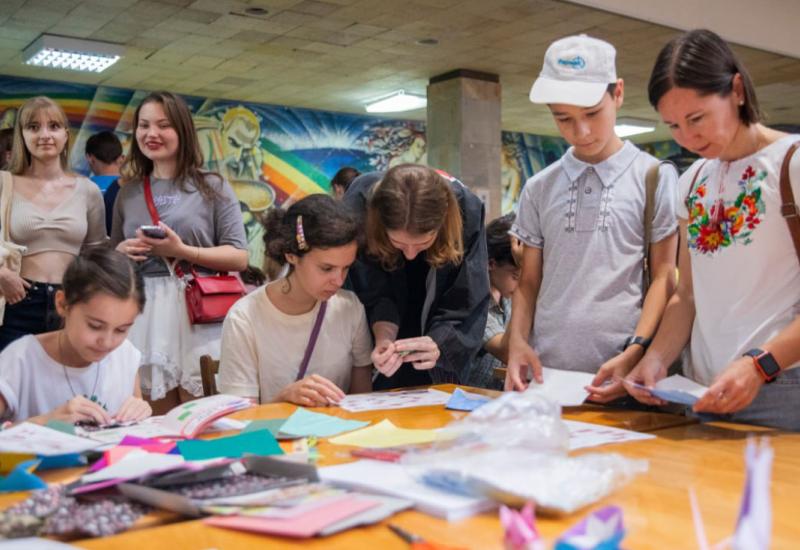‘Business and cultural relations between Ukraine and Japan continue and are successful,’ was the common opinion of Andriy Vitrenko, Deputy Minister of Education and Science of Ukraine, Anatoliy Melnychenko, Rector of Igor Sikorsky Kyiv Polytechnic Institute, and Matsuda Kuninori, Ambassador Extraordinary and Plenipotentiary of Japan to Ukraine, which was a red thread running through their speeches at the opening of the three-day charity festival “Japanese Autumn”, which took place at KPI from 13 to 15 September.
🔥
Anatoliy Melnychenko stressed that after the start of russia's full-scale aggression against Ukraine, Japan was one of the first countries to lend a helping hand to our country, and that Ukrainians feel supported and thank Japan for its solidarity and for everything its citizens are doing in difficult times for our country. He confirmed that cooperation with partners from the Land of the Rising Sun will continue to be a priority for Igor Sikorsky Kyiv Polytechnic Institute, and the Ukrainian-Japanese Centre has been and will remain a bridge in the field of cooperation between the university and Japanese partners in the educational, scientific, technical, cultural, and human dimensions. Anatolii Melnychenko expressed hope that the many interesting events of the festival would help visitors to enrich themselves with the national spirit of Japan and its indomitable spirit, a trait that is also inherent in us, Ukrainians.
The festival participants will remember the online lecture ‘National Security and Foreign Policy of Japan’, which was held on the opening day of the festival by the Ambassador of Japan to Ukraine Matsuda Kuninori. He began his speech by saying that in recent years he has had the honour of working closely with the faculty of Igor Sikorsky Kyiv Polytechnic Institute and the Ukrainian-Japanese Centre of Igor Sikorsky Kyiv Polytechnic Institute and witnessing concrete efforts to promote cultural exchanges between our peoples.
In his speech, Matsuda Kuninori analysed the international situation that has developed due to russia's war of aggression against Ukraine: ‘This aggression by the neighbouring state of Ukraine and Japan is a direct threat to peace and stability not only in the Euro-Atlantic area, but also in the Indo-Pacific and other regions of the world. russia's aggression against independent Ukraine is an atrocity that is somehow destroying the foundations of the international order. Japan has felt this crisis and has significantly changed its foreign policy towards the russian federation. This кussian aggression against Ukraine is an atrocity that has shaken the foundation of the international order. In the future, Japanese-Ukrainian relations will be based on cooperation in imposing sanctions against russia, economic support for Ukraine, providing our country with non-lethal weapons and diplomatic work with the countries of the Global South, and strengthening the basic defence capabilities of the Land of the Rising Sun. Events such as today's Japanese Autumn festival will contribute to further cooperation between Japan and Ukraine. I am confident that the educational and cultural ties between our two nations will continue to strengthen.’
Another extremely interesting lecture was delivered by Professor Kunisue Norito of the University of Tokyo. For 36 years, he worked as a correspondent for the Asahi Shinbun, a popular national newspaper in Japan, and was the head of correspondent offices in Paris and London. During his career, Kunisue Norito covered not only European politics, but also wrote extensively about conflicts in different parts of the world. In 2022, as European editor, he led a team reporting on the russian-Ukrainian war in Japan and visited Ukraine six times to study the situation on the ground. He has recently published a book entitled ‘The russian-Ukrainian War - A View from Near and Far’, which he has been collecting since the beginning of russia's full-scale invasion of Ukraine during his business trips to our country, and presented to the audience during the lecture. In addition, working as part of an international legal team, which includes Ukrainian lawyer Yuriy Bilous, who collects evidence of war crimes, Kunisue Norito investigates and documents crimes against human rights, and appeals to international bodies to bring the perpetrators to justice. According to him, the volume of work is growing almost every day, because russia has made war crimes its method of warfare and deliberately inflicts pain and suffering on Ukrainians to break their will to resist. Kunisue Norito plans to continue writing books about the struggle of Ukrainians against russian invaders to convey to her compatriots the painful truth about what war is and that it is closer than it seems: ‘There is a prevailing attitude in Japanese society that since the Land of the Rising Sun has lived without war for almost eighty years, we can believe that blood will never be shed in Japan again. Therefore, my mission as a writer and journalist is to convey to a large audience the main message that there is russia between Japan and Ukraine. And that the threat from the latter cannot be forgotten.’ Therefore, according to Professor Norito, Japan will be with Ukraine constantly in the future, and the current stage is a significant moment in the history of both our countries.
After the Japanese Autumn festival, the Kyiv Polytechnic correspondent took the opportunity to talk to Anna Omelchenko, project coordinator of the Ukrainian-Japanese Centre of Igor Sikorsky Kyiv Polytechnic Institute, about the results of this crowded event, which, by the way, involved 150 volunteers. According to her, the constant interest of the festival visitors in all its events, each of which is simply impossible to describe in a newspaper article and which took place over three days, showed that Japan is interesting to us as a distant but friendly country. And the attempts to create embroidered temari balls, postcards from dried oshibana flowers or eco-bags from furoshiki, to hear master Un Ryu play the shakuhachi flute, to play Japanese logic games such as go and shogi, and to see performances by martial arts masters, etc. will remain unforgettable impressions for more than three thousand visitors of the festival.

